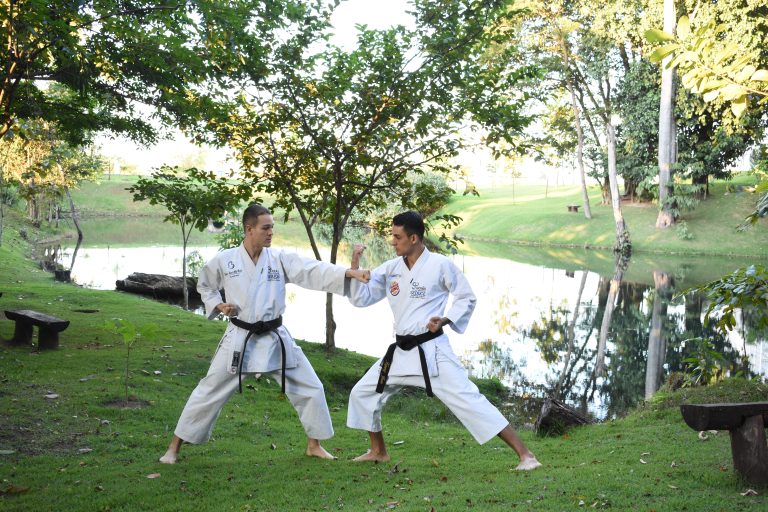The Benefits of Karate: Is it the Ultimate Way to Improve Your Health and Wellbeing?
Are you looking to get fit and increase your overall wellbeing in a sustainable way? Have you heard about the potential benefits of karate, but aren’t sure if it’s the right option for you? From physical to mental benefits, karate may well be the answer to some of your health and wellbeing questions.
Karate is a Japanese martial art that has been practiced for centuries. It is a combat sport and art form that combines physical and mental disciplines such as blocking and striking, as well as forms and sparring. The aim is to achieve harmony between body and mind. Karate is accessible for all ages and fitness levels, and it includes a variety of different styles and forms. Top-tier karateka often compete, but beginner and recreational karate can provide a range of therapeutic benefits.
In this blog article, we’ll explore why karate is so beneficial for health and wellbeing. We’ll discuss the many physical and mental benefits, as well as explore how they promote overall wellbeing. Finally, we’ll provide some suggestions for getting started on your karate journey.
The Physical Benefits of Karate
Karate is a form of exercise that works every muscle throughout the body. As such, it provides a range of physical benefits depending on how intensely it is practiced; regardless of fitness level or age.
Structure & Strength
Karate is an excellent way to develop muscle structure and strength. It targets both the major muscle groups as well as postural muscles that help you maintain proper posture. Regular karate training can improve muscle conditioning, helping to boost performance in other activities such as running or cycling.
Karate also helps to improve core strength, balance and coordination. This is because many of the exercises involve multiple muscle groups working together in sequence, which helps to strengthen coordination between muscles. There are also plenty of drills in which the objective is to maintain form whilst performing quick shifts in balance and movement.
Cardiovascular Fitness
Karate can be an excellent form of cardio exercise; the combination of martial arts techniques with the potential for high-intensity sessions means it can help improve overall cardiovascular health. This can be especially beneficial for people looking for an alternative to running or cycling.
For those who don’t have time for longer workouts, sessions can be broken down into more manageable portions. Kicking drills, for example, are excellent for getting the heart rate up and burning calories. They also help develop leg power and coordination skills used in actual kicking techniques.
Mental Benefits of Karate
Whilst it’s easy to get caught up in the physical perks of karate, mental benefits should not be overlooked. Through regular practice of karate, participants can develop inner calmness, focus, and discipline; using these skills in everyday life situations beyond the dojo.
Stress Relief & Relaxation
Karate is renowned for being an excellent stress reliever. The physical exercise produces endorphins which naturally induce calmness, a sense of overall well-being, and relaxation. Additionally, the exercises often require intense concentration for both physical technique and form, allowing the mind to switch off from outside worries and find inner calmness through focussing on one particular task at hand.
It’s also a great way to socialise; karate can provide an outlet or distraction from difficult or confrontational situations that participants encounter in their day-to-day lives. Being in such an environment can further reduce stress levels, helping to bring participants into a much more relaxed state of mind.
Mental Discipline & Confidence
The requirements of karate– such as studying technique, perseverance through practice, and self-discipline– can help individuals develop essential mental disciplines outside of traditional education systems. The routine nature of karate helps to create new neural pathways in the brain which are used to refine techniques and improve overall technique quality. It also encourages problem solving from different angles, along with improved focus and concentration (especially desirable for students).
Karate also helps individuals to strengthen their self-esteem; through achieving small goals such as a belt exam or successfully performing a new technique, karateka often experience improved self-confidence. This helps them undertake various tasks with more confidence knowing they have the necessary resilience, focus, and perseverance to complete tasks they set themselves; applicable both in and outside the dojo.
Overall Benefits of Karate & Wellbeing
Karate aids overall wellbeing in many different ways; beyond the physically beneficial exercises such as strengthening muscles and improving cardio fitness, there are overwhelming mental benefits that can arise from regular practice. Karate can be a great holistic approach to improving health through raising the self-esteem and confidence of the practitioner, which leads to increased levels of positivity and resilience in everyday life situations.
With its mix of physical and mental techniques, Karate is an excellent way for people of all ages and fitness levels to improve their overall wellbeing in a safe, non-contested environment.
Getting Started with Karate
Karate is relatively accessible compared to other combat sports or forms of exercise; it can be practiced by individuals who are completely new to martial arts or by participants looking to add an extra element to their current training regime through new technique explorations or competitions. Below are some suggestions to get you started – if you want to know more, there are plenty of online resources available where you can find demonstrations or tips on technique or etiquette.
- Find A Dojo – Choose a dojo/school by taking into account your location, class schedule and how suitable their teachings are with what you want out of karate.
- Talk To An Instructor – Ask your instructor any questions regarding style differences or training schedules and make sure you feel comfortable with the instruction.
- Start Practicing – Follow your instructor’s guidance when learning techniques and form – repetition is key here! Specialist clothing is not obligatory but comfortable loose fitting clothing suitable for exercise is preferable.
- Practice Outside The Dojo – Revisit techniques outside class times in order to further develop skills.
- Set Small Goals – Set realistic goals to measure your progress; is there a particular move you want to learn? A belt ceremony you’d like to achieve? A contest you’d like to compete in?
In conclusion, karate offers a range of holistic physical and mental benefits, as well as an accessible environment in which these benefits can be achieved: making it suitable for all ages and fitness levels. With regular practice comes improved physical strength, increased joint mobility (through stretching exercises), improved coordination between muscle groups, reduced stress levels and increased self-confidence – all increasing overall wellbeing significantly. These benefits are achievable with just basic knowledge on technique such as how to kick or how to engage core muscles properly during training; however deeper understanding helps unlock more utilisation of various karate styles that have developed over centuries!
Finally, always consider safety above all else – seek guidance on suitable warm-ups/cool downs in order to prevent injury due to sudden movement or overstretching muscles too far after training hard!
Inhaltsverzeichnis






